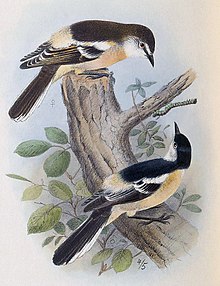Norfolk triller
| Norfolk triller | |
|---|---|

| |
| Illustration by Henrik Gronvold | |
| Scientific classification | |
| Kingdom: | Animalia |
| Phylum: | Chordata |
| Class: | Aves |
| Order: | Passeriformes |
| Family: | Campephagidae |
| Genus: | Lalage |
| Species: | |
| Subspecies: | L. l. leucopyga
|
| Trinomial name | |
| Lalage leucopyga leucopyga (Gould, 1838)
| |
The Norfolk triller (Lalage leucopyga leucopyga) was a small passerine bird in the cuckooshrike family, Campephagidae. It is the extinct nominate subspecies of the long-tailed triller which was endemic to Norfolk Island, an Australian territory in the Tasman Sea between Australia and New Zealand. Little is known of its biology.
Description[]

The Norfolk triller was similar to other subspecies of the long-tailed triller, though it was slightly larger and had a richer buff wash on the underparts and rump and a broader white tip to the outer rectrices.[1]
Behaviour[]
Breeding[]
Breeding was recorded in September, with eggs in December and February. Nests were shallow and cup-shaped, made of lichen, moss and fibrous roots, and lined with finer material. The clutch was usually two eggs.[1]
Extinction[]
The triller was last recorded in 1942. The cause of its extinction was probably predation by black rats combined with clearance of its habitat, Norfolk Island's native subtropical rainforest.[1]
There are specimens of this bird held in the museums at Leiden, Vienna, Tring and in the H. L. White Collection at Melbourne.[1][2]
References[]
External links[]
- "Norfolk Island Triller Lalage leucopyga" by Paul Martinson. Artwork produced for the book Extinct Birds of New Zealand, by Alan Tennyson, Te Papa Press, Wellington, 2006
- EPBC Act extinct biota
- Lalage (bird)
- Extinct birds of Norfolk Island
- Bird extinctions since 1500
- Birds described in 1838
- Endemic fauna of Australia
